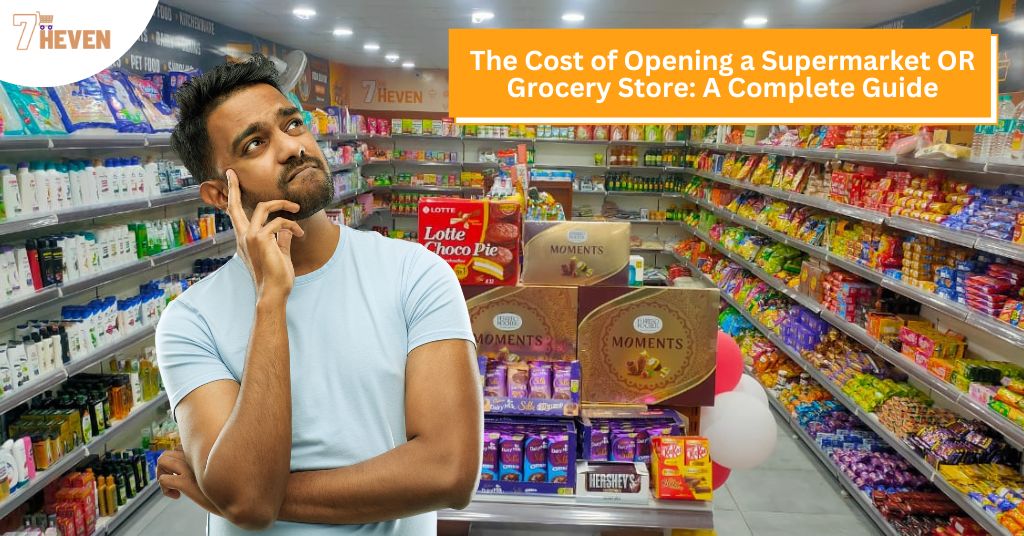Opening a supermarket or grocery store in 2026 presents a significant financial undertaking, especially when considering the cost of opening a supermarket in today’s economic climate. It also requires a thorough understanding of various cost factors.
If you are thinking of starting a new business with a supermarket franchise in India, you must have some burning questions. This means some obvious doubts about the cost of opening a supermarket store and the need for proper guidance from professionals.
Here, we are at your service.
This article is all about proper guidance on starting a supermarket franchise.
Although opening a supermarket store seems a bit costly, you can do it on a small scale. Building your supermarket from small to large can also be a good idea if your budget is low.
Understanding the costs associated with opening a supermarket is crucial for prospective business owners. The costs include real estate expenses, which can vary greatly depending on the location and size of the store.
What is a supermarket franchise?

A supermarket franchise is a business model where an individual or entity (the franchisee) is granted the rights to operate a supermarket under the brand and operational framework of an established company (the franchisor). Also, know the benefits of starting a supermarket business in India.
What is the Expected Cost of Opening a Supermarket?
The cost of opening a supermarket franchise varies depending on different factors. Factors like the location of the store, its size, and the variety of products offered.
The average cost of opening a supermarket is around ₹10 lakhs to ₹2 crores. It depends on the extent of the business.
Some useful steps to know for the opening of a supermarket where the use of money is possible are:
- Location of the Supermarket:
Locating the perfect place for your supermarket is very crucial. For that, you need to purchase or take the place on rent. This is the first expense for setting up a Supermarket Franchise. It is also a strategic choice which will have long term effects. Also, the rent generally starts in the range of thousands, depending on the size. However, the costs of buying a retail space will be higher.
Also read: How to choose the best location for the supermarket?
- Inventory:
The inventory of a business depends on the product type and the quantity that is planned to be sold. The cost of inventory generally ranges from thousands to lakhs, even to crores. It also depends on the store’s size.
- Technologies and Systems: TECH
Investing in inventory management software, security systems, and other technological tools to streamline operations and enhance efficiency. Many items, like computer systems, economical software, etc., make supermarkets run smoothly. Also, it may include the cost of electronic price labels.
- Essentials Equipment and Supplies:
Installing Refrigeration units is important to keep perishable items fresh. Also setting up aisles and product displays to enhance the shopping experience. It is also required to implement checkout systems for efficient customer service. However, the equipment and supplies costs depend on the type and size of the stores.
- Advertising and Marketing:
It is also a very crucial part of setting up a supermarket business. It includes costs of broadcast media local print, discounts, and promotions to attract more and more customers. The costs of advertising vary based on the level at which they are operated.
Is opening a supermarket profitable?
Opening a supermarket store can be profitable. Its success depends on various factors. Like the location, management, and market conditions.
However, profitability requires meticulous planning and efficient operations. High initial costs and ongoing expenses must be balanced with revenue projections.
Advantages of Starting a Supermarket Business:
Starting a supermarket business offers several advantages:-
- Self Service:
If you go to the supermarket as a customer, you must know that you don’t need to ask the seller anything. You just need to enter a supermarket and choose the product.
On the other hand, if you go to the local grocery store, you have to tell them and ask for every product you need. So, self-service is one of the top benefits of the supermarket franchise from a customer and seller perspective.
- No-Bargain Policy:
Supermarket franchises always follow the fixed price rule. Everyone is aware of the price plan of supermarkets. Supermarkets do not allow the customer to bargain with them; instead, they give a discount on the products.
- Neatly Displayed Goods:
Because once people shop in some kind of local shop, they could perhaps make comparisons of a product’s structure, size, and appearance to other products. People would really like to consider starting mostly with clothing and shoes and observing one another’s flaws. They have to come to experience the satisfaction of buying groceries. Customers have access to a neat and helpful display of goods at a supermarket.
- No Credit Policy:
One of the top benefits for supermarket owners is that they don’t need to sell their products on credit. Most customers visit the kirana store to buy household products on credit and pay for them later. In a supermarket, there is no credit policy. And everyone is aware of that.
Strategies for Reducing Start-up Costs in a Supermarket Venture:
- Use Small Business Discounts:
Take advantage of professional savings to reduce business costs during the startup phase. Your suppliers might offer discounts on bulk orders. If you use a certain product regularly, find out if a bulk order is an option.
You might also be eligible for discounts by joining a small business group. For example, your local chamber of commerce probably offers discounts on business-related items.
- Electronic Price Tags:
Start using electronic price tags instead of manual pricing. Manual procedures require physical staff, which directly affects annual cash flow. In addition, electronic price tags eliminate the need to invest in physical tags.
- Discounts on Lease Contracts:
This wholly depends on your wise conversational skills and offers in hand. Ask your landlord and convince them to decrease your rent or give you some discounts for some conditions.
- Install Smart Equipment:
Install energy-optimising equipment & devices that will reduce your electricity bills. Smart lighting, energy-saving refrigerators, and such other devices will reduce your start-up costs.
- Direct Pick Up:
If you’re tight on budget, asking for third-party delivery services would be a bit costly for you. It is better to go directly to the supplier and pick up your orders. This would save you extra money.
Also Read: Documents Required to Start a Supermarket Franchise
Wrap Up:
Understanding the cost to open a supermarket is crucial for aspiring entrepreneurs. Opening a supermarket store seems quite difficult but it actually is not. The cost to open a supermarket is not constant, because it totally depends on the size of the supermarket, inventories and location. You can take advice from a financial expert as they can tell you everything about it in detail, and you will not miss out a single detail.
Frequently Asked Questions:
Ans: The main costs include real estate, inventory, equipment, technology, staffing, and marketing.
Ans: Strategies include leasing instead of buying, negotiating with suppliers, investing in energy-efficient appliances, and utilising cost-effective technology solutions.
Ans: Yes, a well-managed supermarket in a good location can be profitable, but success depends on effective planning, efficient operations, and staying adaptable to market trends.
Ans: Benefits include brand recognition, comprehensive support, access to established supply chains, and reduced start up risks.


